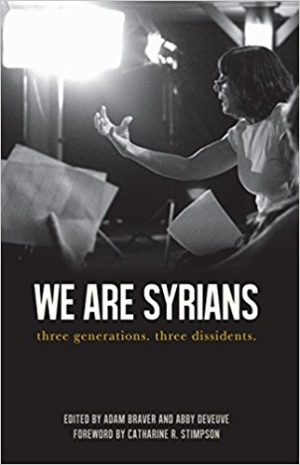We Are Syrians
Three Generations, Three Dissidents
The fourth book in the Broken Silence series, We Are Syrians (edited by Roger Williams University’s Adam Braver and Abby Deveuve) is a composite oral history of a half century of Assad family leadership. Formed of first-person narratives compiled from interviews with three Syrians who now reside in the United States, the book traces the country’s descent into authoritarian rule.
Naila Al-Atrash joined the Communist Party, which funded her theatre studies in Bulgaria, as a teenager. When she returned to Syria in 1978, government officials attended her Damascus National Theater production of Night of the Slaves, which was subsequently banned for its political message. After years of teaching and supporting pro-democracy movements, during which she was fired and kept under house arrest, Al-Atrash fled Syria via the Scholars at Risk program.
In the 1990s, Radwan Ziadeh educated himself about events airbrushed from Syrian history—like the Hama massacre—and wrote books and articles about human rights in Arab countries. Especially after helping form the Damascus Declaration for Democratic Change, he was frequently interrogated by security agents. When he left Syria for good in 2007, a warrant was issued for his arrest if he ever returned.
Unlike the others, Sana Mustafa was not forced to leave Syria due to dissident activities. When she and her sister were briefly arrested after participating in a 2011 demonstration, it only made it “clearer to us what we were fighting against,” Mustafa says. After a fellowship in the United States via the Middle East Partnership Initiative, she applied for asylum to remain. Today she is uncertain whether her imprisoned father is alive, while the rest of her family resides in Turkey.
As if coincidentally, these three stories fit together to provide a full, chronological account of the repressive Assad reign and citizens’ efforts to advance democracy. The editors wisely let their subjects’ stories speak for themselves; apart from an introduction, they make negligible interruptions in the text. Especially under the current American administration, it’s more important than ever to understand refugees’ experiences. This compelling, clear-eyed book should help ordinary Americans to empathize with the plight of Syrians today.
Reviewed by
Rebecca Foster
Disclosure: This article is not an endorsement, but a review. The publisher of this book provided free copies of the book to have their book reviewed by a professional reviewer. No fee was paid by the publisher for this review. Foreword Reviews only recommends books that we love. Foreword Magazine, Inc. is disclosing this in accordance with the Federal Trade Commission’s 16 CFR, Part 255.

